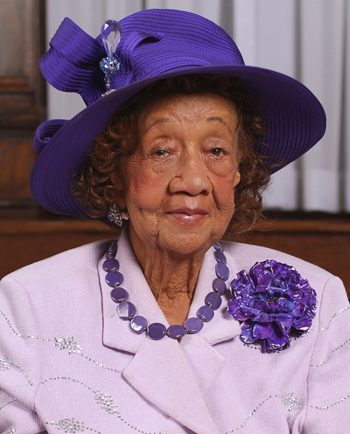A look at the life and impact of this trailblazing civil rights activist.
I was 10 when I met Dorothy Height. My parents were civil rights workers, leaders of the Philadelphia to Philadelphia Project, a civil rights initiative linking Philadelphia, PA to Philadelphia, MS. As a consequence of my parents’ work, I met some remarkable people when I was very young who would help shape my perspective on the world.
Dorothy Height was one of those people.
When I heard she had died after a brief illness at the age of 98, I was reminded of that childhood meeting, of her holding out her hand to me in a greeting that grown-ups didn’t usually offer children.
At her death on April 20, 2010, memorials focused on her work in the black civil rights movement–which was prodigious and began with anti-lynching protests in the 1930s. But Height was as much a feminist icon as she was an icon for African-Americans. As Rep. John Lewis, one of the “Big Six” who planned the 1963 March on Washington, said of her, “she was a feminist, and long before there was a women’s movement.”
At 17, Height was admitted to Barnard College, but a quota system for blacks at that time–1929–only allowed two black “girls” a year. When she showed up for enrollment she was the third student. Height attended New York University instead. By the time she was 22 she had a master’s degree. At 25, she became involved with the National Council for Negro Women (NCNW) which sparked her life-long commitment to and involvement in the black civil rights movement. In 1957, she was named president of NCNW and remained in that post for 40 years.
One of Height’s missions in the 1950s and 1960s was to bridge the gap between North and South. She created “Wednesdays in Mississippi,” intensive dialogues about the nation’s most oppressively racist state. She brought white and black women from the North to the South together to give each a keener understanding of the impact of racism and racial inequality on blacks in Mississippi.
The work that Height did was manifold–she was both street fighter and board-room organizer. By the time she was 30, she was advising national leaders, starting with Eleanor Roosevelt. She was an advisor to numerous presidents, advising Eisenhower to desegregate the nation’s schools and Johnson to add black women to his cabinet and other positions of power in his administration. She stood by John F. Kennedy when he signed the Equal Pay Act for women. Height was a friend and supporter of and advisor to both Hillary and Bill Clinton.
In 2004, George W. Bush awarded Height the Congressional Gold Medal for her civil rights work. She was 92. Of Height, Bush said, she was a “giant of the civil rights movement” and that she had advised presidents–whether they wanted her advice or not–for more than 50 years.
Height expanded her civil rights work to include the LGBT community. At 84, Height and then-Human Rights Campaign executive director Elizabeth Birch lobbied Congress for the first vote of the 1996 Employment Non-Discrimination Act. (The vote failed, 50-49.)
She was a tireless supporter of AIDS groups and regularly decried the anti-gay sentiments of many leaders in the African American community. Height, who never married, considered herself an LGBT ally.
In 1997, while being honored at the HRC National Dinner, Height said: “Civil rights are civil rights. There are no persons who are not entitled to their civil rights. We have to recognize that we have a long way to go, but we have to go that way together.”
Height understood early on the double-jeopardy role of her race and gender. She was surprisingly gracious about how little credit she was given for the work she did over the decades. That work included planning the 1963 March on Washington. But like Bayard Rustin, Dr. Martin Luther King Jr.’s advisor and friend whose idea the march had been, Height was side-lined and silenced. She noted in a 2003 NPR interview that the only woman’s voice that was heard that day was Mahalia Jackson’s.
She was first and foremost a woman of immense integrity, compassion, fire and vision. If King saw a future where racial equality was a commonplace, Height envisioned the steps it would take to get there and began taking them early on, dragging others along with her, whether, as Bush noted, they wanted to go or not.
Height lived to see women get the right to vote. She lived to see the desegregation of the schools and the end of Jim Crow. She lived to see a time when there was no quota on the number of black women entering Barnard College and she lived to see that those entering were no longer called “girls.” She lived to be among those sitting front and center at the Inauguration of the first black president, Barack Obama. She lived to become the embodiment of Gandhi’s dictate: Be the change you want to see in the world.
While Height’s passing is sad, it also gives time to reflect on the grand scale of her long, meaningful life. She was an extraordinary woman of style, grace, wit, intellect and vision. Her implementation of that vision utterly changed our world. She was a woman who shook the hands of little girls and heads of state and treated them with equal value. She knew how to stand up to anyone and stand up for everyone. She was amazing–and she was one of us.
